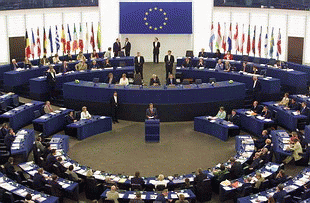In a few weeks from now, 27 countries will vote for their European Parliament representatives. According to polls in member-states, Europeans will make their choices, based more on their domestic (national) political issues and less on the Union's affairs. For professor Simon Hix of the London School of Economics that consists the "tragedy" of the seventh European Parliament elections. Most of the Europeans seem to ignore the actual politics of Brussels and Strasbourg, focusing on their own territories and their own national issues. Why does it happen? The answer can be found on EU's lack of a progressive political agenda which would really "touch" the actual problems of the member-states.
There are plenty of issues which the European Union has so far failed to create a context within which possible solutions would be found. From unemployment to climate changes and from social inequalities to foreign policy, the EU has a lot of hard work to do. If that happens, it is because the Union has shown incapability to identity itself in our contemporary world order. Moreover, the present form of the European Union's function cannot guarantee the needed quick and effective responses that a supranational organisation should take.
Α generous institutional reform must take place - a reform that will make EU's institutions (European Parliament, Commission, European Council etc) more flexible in decision-making. Because, indeed, one of Brussels' fundamental problems is the lack of a direct relation between the EU institutions and European societies themselves; a situation which deprives the Union from responding vigorously to peoples' actual concerns. Costas Simitis, former Premier of Greece and a consistent advocate of Pro-Europeanism, has pointed out* successfully that "the invigoration of Democracy (within the EU) requires the emergence of its political aspects, the free public deliberation on issues, the discussion of the problems in an open and wide space of political dialogue. Through that way, we can ensure transparency and (political) regulation".
The common european policies needs to be discussed in front of all the 27 national audiences, with the guarantee that all opinions matter thus contributing to the creation of common strategies. What people in Europe need is to feel that the Union really cares for their problems and makes everything possible to give solutions. But for that, the EU has to overcome its strictly bureaucratic character and present a different, more intelligible and more unambiguous democratic framework within which new progressive policies will be applied. Obviously, that is not an easy job.
The European Union needs to re-identify its own role in a world that is changing. By self-identifying itself, Europe has to take decisions on matters that are of fundamental importance for its function and existence. The Union has to shape its strategic partnership with the United States, to find the "key" for acquiescence in common issues regarding economic regulation, immigration, foreign and security policy, prevention of crime, counter-terrorism, environmental protection, academic research and creative technology. But, most importantly, Europe must protect its unique character as the cornerstone continent of Culture, Education and Welfare state; a place where human, political and religious rights are fully guaranteed. Τhat can be done through a progressive political agenda which will fortify the vested rights of social welfare state and solidarism, along with the reinforcement of investment for jobs and skills. That is the safe way to the covetable European Integration.
Therefore, our Europe is the Social Europe. It is the Europe which takes tough, but generous, decisions from the Maastricht Treaty to Nice and from the Euro adoption to the Lisbon Treaty. That Europe is the one which tries to retouch the common European Constitution through regular negotiations and dialogue. Negativeness, pessimism and conservative obsessions cannot bring any political progress and obviously do not contribute anything to the aim of a really strong, in both institutional and democratic terms, United Europe. The present and future leaders of Europe must be well aware as long as heavy responsibilities lay ahead for the common future of european nations.
NOTES:
* Speech at the Parliament during the validation vote for the Lisbon Treaty, Athens, June 11, 2008.
European Parliament.
Gateway of the European Union.
Political Parties of the E.U.





